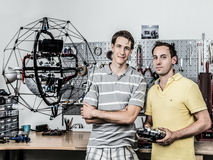TOP 100 Startup Award 2015: Third place with flying robots
17.09.2015
A robot reminiscent of a dandelion. It rolls, it floats and it can even poke people without injuring them: the Gimball drone by Flyability.
 Flyability with their robot Gimball (photo: Tina Sturzenegger)
|
Anybody looking to get in on the drone business cannot afford to just sit around. “We cannot afford to allow for organic growth. We are under huge pressure to bring a product onto the market as soon as possible,” says Patrick Thévoz, CEO and co-founder of Flyability. This is no overstatement. When the ETH Lausanne spin-off was founded in September 2014, the company, which is dedicated to the development of drones with all-new flying characteristics, consisted solely of Thévoz and his partner Adrien Briod. One year later, the startup’s ranks had swelled to 17 employees, all engineers specializing in robotics and artificial intelligence with the exception of a lawyer. The first prototypes of the drone, called Gimball, have already been sold. A total of 200 units are planned for 2016, and Flyability wants to be producing hundreds more in 2017.
A glimpse of the company headquarters in the historic center of Lausanne suggests, for the time being at least, that mass production is still some way off. The drones are manufactured in a windowless back room that contains two 3D printers, a CAD cutting machine and a clutch of soldering irons. An assembled Gimball sits on an IKEA sofa in the reception, meeting and coffee room. The unique feature: its spherical structure made from composite materials that houses the actual flying apparatus. Thanks to this innovation, the drone is not put out of action if it collides with an obstacle. Gimball is the very first drone to exhibit such characteristics and, in doing so, opens up all kinds of new application possibilities – flying between bridge support beams for inspection purposes, checking the inside of power point boilers or flying into burning buildings to survey the situation.
Flyability owes its rapid growth largely to the proceeds gained from various startup and technology prizes, such as Venture Kick and venture leaders. The most significant of these was the Drones for Good Award endowed with one million dollars. As a result, the founders were able to employ staff as well as being thrust firmly into the international limelight. “That gave us a lot of credibility,” says Thévoz. “Now everybody in the drone sector knows who we are.”
A famous Swiss startup
Flyability is well known in Switzerland but also internationally. No doub that the Arab Emirates award helped them conquer the heart of BBC, Business Insider and many others. Above all, Flyability could count on the support of many programs. They for example won the Venture Kick final in 2014, and flew to Boston and New York with the Swiss national startup team in 2014.
A glimpse of the company headquarters in the historic center of Lausanne suggests, for the time being at least, that mass production is still some way off. The drones are manufactured in a windowless back room that contains two 3D printers, a CAD cutting machine and a clutch of soldering irons. An assembled Gimball sits on an IKEA sofa in the reception, meeting and coffee room. The unique feature: its spherical structure made from composite materials that houses the actual flying apparatus. Thanks to this innovation, the drone is not put out of action if it collides with an obstacle. Gimball is the very first drone to exhibit such characteristics and, in doing so, opens up all kinds of new application possibilities – flying between bridge support beams for inspection purposes, checking the inside of power point boilers or flying into burning buildings to survey the situation.
Flyability owes its rapid growth largely to the proceeds gained from various startup and technology prizes, such as Venture Kick and venture leaders. The most significant of these was the Drones for Good Award endowed with one million dollars. As a result, the founders were able to employ staff as well as being thrust firmly into the international limelight. “That gave us a lot of credibility,” says Thévoz. “Now everybody in the drone sector knows who we are.”
A famous Swiss startup
Flyability is well known in Switzerland but also internationally. No doub that the Arab Emirates award helped them conquer the heart of BBC, Business Insider and many others. Above all, Flyability could count on the support of many programs. They for example won the Venture Kick final in 2014, and flew to Boston and New York with the Swiss national startup team in 2014.


